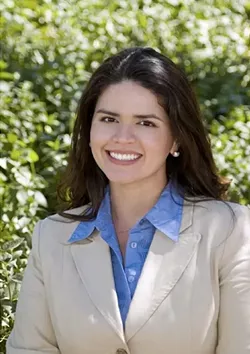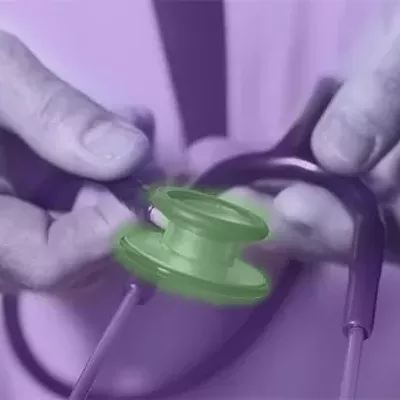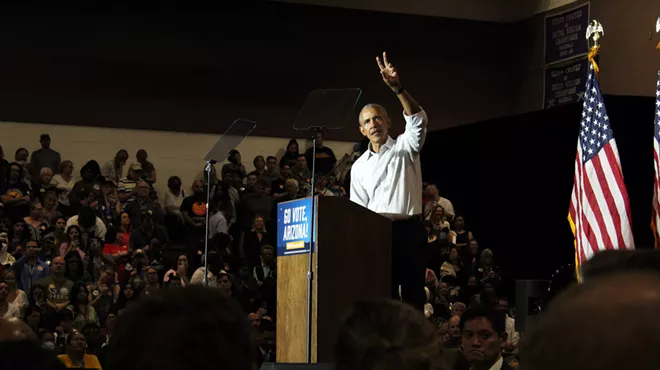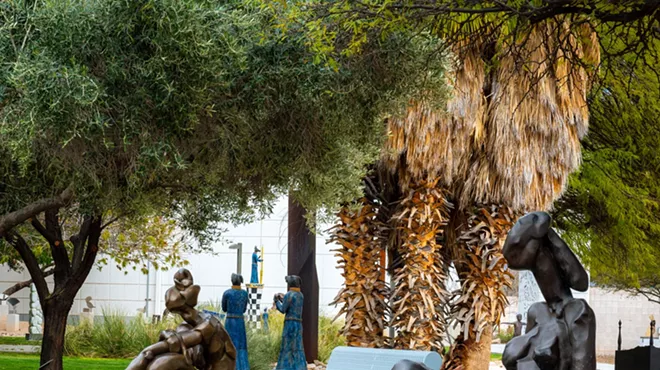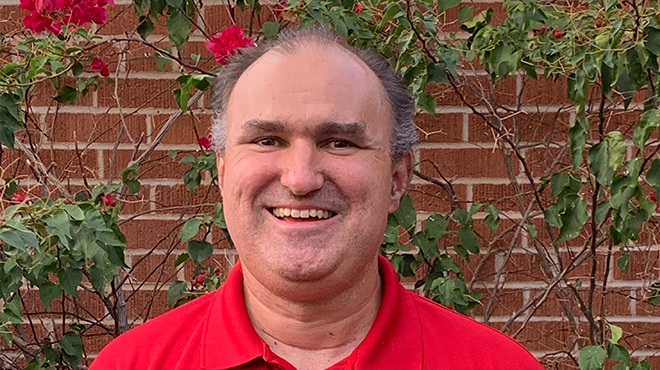Saturday, March 28, 2020
Your Southern AZ Coronovirus Roundup for Saturday, March 28: AZ Cases Rise to 773; 120 Cases in Pima County; Romero Orders Closure of Non-Essential Biz in Tucson and Urges Residents To Stay Home
A total of 773 cases of COVID-19 have been confirmed in Arizona on Saturday, March 28, according to the morning report from the Arizona Department of Health Services.
That's a jump of 108 from yesterday's 665.
There are now 120 confirmed cases in Pima County.
The virus has killed 15 people in Arizona, including at four in Pima County—a woman in her 50s, a man in his 70s, a woman in her 80s and a man in his 80s. All had underlying health conditions that put them at higher risk.
In Maricopa County, the number of confirmed COVID-19 cases has risen to 454 cases.
Many Tucson businesses will be closing today after Mayor Regina Romero last night issued an order to shutter all non-essential businesses that are not protected from mandatory closure by Gov. Doug Ducey, who has said that Arizona needs to has consistent rules statewide. Romero’s order is effective through Friday, April 17.
“After consulting with my colleagues on the City Council, the City Manager, City Attorney, medical professionals, small businesses, and other stakeholders, I have determined that these actions are necessary to protect public health,” Romero said. “Although these are painful decisions, we have a moral obligation to do what is in the best interest of our residents and protect public health.”
Romero said she wished she could do more, but Ducey’s order—which allows grocery stores, pharmacies, restaurants (via takeout and delivery), barber shops, beauty parlors, parks, golf courses and other “essential” businesses to remain open—limited how many businesses she could order closed. She asked Tucsonans to stay home and avoid necessary trips and urged Ducey to issue a statewide “stay-at-home” order.
“In the absence of clear statewide direction, we are taking swift action at the local level to protect the health and well-being of Tucsonans,” Romero said. “We cannot afford to wait any longer; COVID-19 is not waiting and neither can we. If Gov. Ducey is unwilling to take decisive action at the state level, then he needs to untie the hands of local jurisdictions and allow us to make decisions that are best for our individual communities. This is particularly critical with respect to the operations of ‘personal hygiene’ and other services that conflict with CDC social distancing guidelines and could jeopardize public health.”
Health and government officials have urged the public to avoid unnecessary trips and gatherings of more than 10 people. They warn that the extremely contagious virus is rapidly spreading in the community. Symptoms can take up to 14 days to appear, so people can pass COVID-19 without realizing they have been infected with it. Some people remain entirely asymptotic but are carriers.
In Oro Valley, Mayor Joe Winfield extended closures of bars, gyms, theaters and other places where people gather through the end of the declared statewide emergency. As in other communities, restaurants remain open for take-out and delivery.
In addition to extending that mandate, Winfield’s latest amendment also closed playgrounds, basketball courts, fenced dog parks and other amenities in the town and strongly urged personal hygiene businesses to close. He also suspended regulation on temporary signs to aid businesses that remain open.
“The Town Council understands that this unprecedented situation is significantly impacting many of our local businesses,” said Winfield in a statement. “Suspending enforcement of the temporary sign code in our commercial corridors is one meaningful way we can try to help businesses that have modified operations to let our residents know they are open for business. I hope the community will continue to patronize these places, as appropriate, during this emergency.”
The Pima County Board of Supervisors on Thursday voted 3-2 to extend its own emergency through Friday, April 10. Democratic Supervisors Richard Elías, Sharon Bronson and Ramón Valadez voted in favor, while Republican Supervisors Ally Miller and Steve Christy voted against the measure.
On Friday, March 20, Arizona Gov. Doug Ducey and Superintendent of Public Instruction Kathy Hoffman also announced a two-week extension on public school closures, to last until April 10.
In the face of the spreading virus, Ducey has also halted to evictions for 120 days; ordered bars, gyms and theaters to be closed in any county with confirmed COVID-19 cases; halted all elective surgery to keep hospital beds available for COVID-19 patients; loosened regulations to make telemedicine more available and increase eligibility for AHCCCS, the state's Medicaid program; and activated the National Guard to assist in grocery stores as Arizonans clear the shelves.
Arizona's schools remain closed at least through April 10. Schools are transitioning to online learning and districts across the region are delivering lunch and breakfast meals to kids via school buses or setting up central locations.
Courts have rescheduled most hearings to avoid spreading the virus.
COVID-19 symptoms typically occur two to 14 days after exposure, and include headache, fever, cough, and shortness of breath, according to the CDC. However, some cases of the virus are entirely asymptomatic. Practices to avoid infection include social distancing (of at least six feet), washing your hands, avoiding unnecessary trips and not touching your face. COVID-19 can survive on cardboard for up to 24 hours, and on stainless steel and plastic surfaces up to three days.
If you think you have been exposed to COVID-19 and develop a fever, cough or difficulty breathing, speak with a healthcare provider for medical advice. According to the CDC, people who are mildly ill with COVID-19 are able to recover at home. Stay at home and avoid public transportation, but stay in touch with your doctor. If you do leave your home, wear a facemask and clean your hands often. If you develop more severe symptoms (persistent pain or pressure in the chest, confusion, bluish lips) get medical attention immediately. Your local health authorities will give instructions on checking your symptoms and reporting information.
Have you caught COVID-19? Are you feeling ill? Is your small business struggling to make it? Have you lost your job as a result of the outbreak? Are you struggling to manage your kids while schools are closed? Tell us your COVID-19 stories. Send an email or photo to tucsoneditor@tucsonlocalmedia.com.
That's a jump of 108 from yesterday's 665.
There are now 120 confirmed cases in Pima County.
The virus has killed 15 people in Arizona, including at four in Pima County—a woman in her 50s, a man in his 70s, a woman in her 80s and a man in his 80s. All had underlying health conditions that put them at higher risk.
In Maricopa County, the number of confirmed COVID-19 cases has risen to 454 cases.
Many Tucson businesses will be closing today after Mayor Regina Romero last night issued an order to shutter all non-essential businesses that are not protected from mandatory closure by Gov. Doug Ducey, who has said that Arizona needs to has consistent rules statewide. Romero’s order is effective through Friday, April 17.
“After consulting with my colleagues on the City Council, the City Manager, City Attorney, medical professionals, small businesses, and other stakeholders, I have determined that these actions are necessary to protect public health,” Romero said. “Although these are painful decisions, we have a moral obligation to do what is in the best interest of our residents and protect public health.”
Romero said she wished she could do more, but Ducey’s order—which allows grocery stores, pharmacies, restaurants (via takeout and delivery), barber shops, beauty parlors, parks, golf courses and other “essential” businesses to remain open—limited how many businesses she could order closed. She asked Tucsonans to stay home and avoid necessary trips and urged Ducey to issue a statewide “stay-at-home” order.
“In the absence of clear statewide direction, we are taking swift action at the local level to protect the health and well-being of Tucsonans,” Romero said. “We cannot afford to wait any longer; COVID-19 is not waiting and neither can we. If Gov. Ducey is unwilling to take decisive action at the state level, then he needs to untie the hands of local jurisdictions and allow us to make decisions that are best for our individual communities. This is particularly critical with respect to the operations of ‘personal hygiene’ and other services that conflict with CDC social distancing guidelines and could jeopardize public health.”
Health and government officials have urged the public to avoid unnecessary trips and gatherings of more than 10 people. They warn that the extremely contagious virus is rapidly spreading in the community. Symptoms can take up to 14 days to appear, so people can pass COVID-19 without realizing they have been infected with it. Some people remain entirely asymptotic but are carriers.
In Oro Valley, Mayor Joe Winfield extended closures of bars, gyms, theaters and other places where people gather through the end of the declared statewide emergency. As in other communities, restaurants remain open for take-out and delivery.
In addition to extending that mandate, Winfield’s latest amendment also closed playgrounds, basketball courts, fenced dog parks and other amenities in the town and strongly urged personal hygiene businesses to close. He also suspended regulation on temporary signs to aid businesses that remain open.
“The Town Council understands that this unprecedented situation is significantly impacting many of our local businesses,” said Winfield in a statement. “Suspending enforcement of the temporary sign code in our commercial corridors is one meaningful way we can try to help businesses that have modified operations to let our residents know they are open for business. I hope the community will continue to patronize these places, as appropriate, during this emergency.”
The Pima County Board of Supervisors on Thursday voted 3-2 to extend its own emergency through Friday, April 10. Democratic Supervisors Richard Elías, Sharon Bronson and Ramón Valadez voted in favor, while Republican Supervisors Ally Miller and Steve Christy voted against the measure.
On Friday, March 20, Arizona Gov. Doug Ducey and Superintendent of Public Instruction Kathy Hoffman also announced a two-week extension on public school closures, to last until April 10.
In the face of the spreading virus, Ducey has also halted to evictions for 120 days; ordered bars, gyms and theaters to be closed in any county with confirmed COVID-19 cases; halted all elective surgery to keep hospital beds available for COVID-19 patients; loosened regulations to make telemedicine more available and increase eligibility for AHCCCS, the state's Medicaid program; and activated the National Guard to assist in grocery stores as Arizonans clear the shelves.
Arizona's schools remain closed at least through April 10. Schools are transitioning to online learning and districts across the region are delivering lunch and breakfast meals to kids via school buses or setting up central locations.
Courts have rescheduled most hearings to avoid spreading the virus.
COVID-19 symptoms typically occur two to 14 days after exposure, and include headache, fever, cough, and shortness of breath, according to the CDC. However, some cases of the virus are entirely asymptomatic. Practices to avoid infection include social distancing (of at least six feet), washing your hands, avoiding unnecessary trips and not touching your face. COVID-19 can survive on cardboard for up to 24 hours, and on stainless steel and plastic surfaces up to three days.
If you think you have been exposed to COVID-19 and develop a fever, cough or difficulty breathing, speak with a healthcare provider for medical advice. According to the CDC, people who are mildly ill with COVID-19 are able to recover at home. Stay at home and avoid public transportation, but stay in touch with your doctor. If you do leave your home, wear a facemask and clean your hands often. If you develop more severe symptoms (persistent pain or pressure in the chest, confusion, bluish lips) get medical attention immediately. Your local health authorities will give instructions on checking your symptoms and reporting information.
Have you caught COVID-19? Are you feeling ill? Is your small business struggling to make it? Have you lost your job as a result of the outbreak? Are you struggling to manage your kids while schools are closed? Tell us your COVID-19 stories. Send an email or photo to tucsoneditor@tucsonlocalmedia.com.


